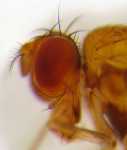
07 Nov Study of Fruit Flies Identifies Novel Human Obesity Genes
MedicalResearch.com Interview with:
Neha Agrawal PhD
Department of Physiology
Development and Neuroscience
University of Cambridge
MedicalResearch.com: What is the background for this study?
Response: Obesity levels are rising rapidly around the world and are a major risk factor for diseases such as Type 2 diabetes, cancers and recently, COVID-19. New strategies to understand obesity are thus needed to prevent and treat obesity and associated disease.
Genetic studies in humans have shown that 40-70% of variation in body weight depends on our genes. Therefore, identifying genes linked to obesity and understanding their function can be a useful way to both understand how we gain weight and identify potential targets for weight loss therapy. However, human genetic obesity studies face significant limitations in identifying causal obesity genes and understanding their relationship to weight gain in human patients.
The model system Drosophila melanogaster (Fruit flies) has provided vital insights into fundamental biology and human diseases for over a century. It is a powerful genetic model with well conserved metabolic pathways. Fruit flies also gain weight when fed a high-sugar or high-fat diet and develop heart disease and diabetes. We therefore decided to use fruit flies to identify novel obesity genes and their site of action in the body.
MedicalResearch.com: What are the main findings?
Response: To identify new obesity genes, we sequenced DNA from severely obese children and searched for rare genetic changes in their genes. We focussed on a set of genes that had not been previously linked to obesity and identified their evolutionary counterparts (orthologues) in flies.
Using elegant genetic tools available in flies, we then reduced the activity of each gene in turn, ubiquitously as well as specifically in the brain or adipose tissue. We assessed whether this genetic knockdown gave fat flies and identified four novel obesity genes.
One of these genes is part of a well conserved signalling pathway knows as the ‘Hippo’ signalling pathway. We found that other components of this pathway when knocked down specifically in the brain, also give fat flies. Importantly, we found that some Hippo pathway components also have rare variants in a larger cohort of obese individuals demonstrating the strength of our approach.
MedicalResearch.com: What should readers take away from your report?
Response: Our cross-disciplinary study used new genetic data from children with severe early-onset obesity and provides proof of principle that functional screens in fruit flies can identify new genes and signalling pathways associated with human obesity. This work provides the first evidence for the role of the highly conserved Hippo pathway in the regulation of human adiposity.
Our study has demonstrated that the humble fruit fly is an efficient and economical model to identify and assess the function of human obesity genes at a whole organism-level.
MedicalResearch.com: What recommendations do you have for future research as a result of this work?
Response: Our study has demonstrated that fruit flies provide an effective platform that allows in vivo identification of novel candidate human obesity genes. This will provide a screening strategy to identify more novel obesity genes from larger cohorts of obese individuals.
Obesity is an organism-level disorder that affects multiple organs and perturbs inter-organ communication. A comprehensive understanding of obesity thus benefits from studies in fruit flies where this integrative network can be examined in vivo. Functional studies in fruit flies will thus help in understanding how these novel obesity genes regulate weight gain. This will highlight important targets for development of new therapies to treat obesity and associated disorders.
Citation:
JOIN OUR EMAIL LIST
[mailpoet_form id="5"]We respect your privacy and will never share your details.
[last-modified]
The information on MedicalResearch.com is provided for educational purposes only, and is in no way intended to diagnose, cure, or treat any medical or other condition. Always seek the advice of your physician or other qualified health and ask your doctor any questions you may have regarding a medical condition. In addition to all other limitations and disclaimers in this agreement, service provider and its third party providers disclaim any liability or loss in connection with the content provided on this website.
Last Updated on November 7, 2021 by Marie Benz MD FAAD
